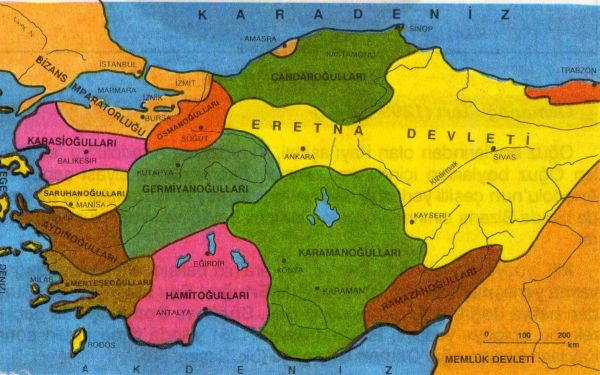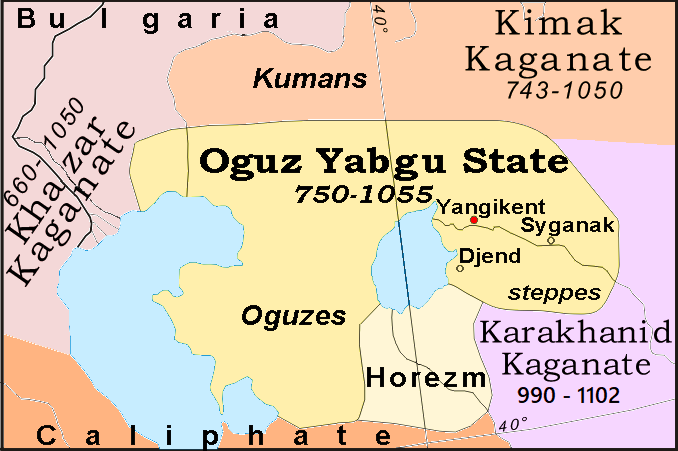Turks - Challenging the 'Elite Dominence' theory
Printed From: History Community ~ All Empires
Category: Regional History or Period History
Forum Name: Steppe Nomads and Central Asia
Forum Discription: Nomads such as the Scythians, Huns, Turks & Mongols, and kingdoms of Central Asia
URL: http://www.allempires.com/forum/forum_posts.asp?TID=33388
Printed Date: 12-May-2024 at 20:28
Software Version: Web Wiz Forums 9.56a - http://www.webwizforums.com
Topic: Turks - Challenging the 'Elite Dominence' theory
Posted By: Bulldog
Subject: Turks - Challenging the 'Elite Dominence' theory
Date Posted: 08-Mar-2013 at 20:29
|
The elite dominance theory which claims that small bands of nomadic Turkish warriors from Central Asia managed to assimilate a region from Iran to Azerbaycan, parts of the Caucasus, parts of Iraq, Syria all the way into Turkey is one I find a hard time understanding. The main pillar of this theory is the DNA of people in Turkey being different to the DNA of people in Mongolia. There are a number of problems which have started being addressed and investigated. Comparing DNA of people in Turkey and Mongolia today totally ignores the past 1,500 years and migration patterns which have occurred during that time. - The migrating Turks ie Oghuz Turks (Selcuks/Kharzemshahs/Ghaznivids etc) started migrating West - Another mass wave came with Turks fleeing the Mongols. Then waves of migrations fleeing the Timurids and other hordes which rise and fall in Central Asia. Another chapter of history totally ignored in this theory is that the Mongols totally decimated Central Asia, villages/towns/cities that resisted had just about every male killed and most the women raped. I mean Genghiz Khan has 20 million desendants alone. Central Asia before and after the Mongols was totally different. The best comparison would be to check for any similarities between Turkish populations with the Xiongnu and Gokturks. So far such studies have shown a link between the two. The idea that nomadic Turkish warriors marched into heavily populated cities, with sedentary populations who had their own language, culture, literature, arts etc etc would accept the ways and tongue of the 'outsiders' doesn't really make any logical sense. Maybe somebody could explain how city folk would start speaking a foreign language as their mother tongue especially as they would have been seen as barbarians. I could understand if Turkish rulers setup Turkish schools, took young kids, assimilated them and forced everyone to speak Turkish but that simply never happened. In fact the Turkish courts often spoke Arabic, Persian and Turkish they had no notion of modern day nationalism. ------------- ôWhat we do for ourselves dies with us. What we do for others and the world remains and is immortal.ö Albert Pine |
Replies:
Posted By: TheAlaniDragonRising
Date Posted: 08-Mar-2013 at 21:22
|
Bulldog, the same kind of thing happened in what would become the UK too. There is the Normans with the use of French as an administrative language, but there's the Gaels in Scotland who went further, as the vast majority were Pict speakers, which was a kind of Welsh language, converting to the gaelic language. ------------- What a handsome figure of a dragon. No wonder I fall madly in love with the Alani Dragon now, the avatar, it's a gorgeous dragon picture. |
Posted By: Bulldog
Date Posted: 08-Mar-2013 at 23:09
But over time didn't the Normans, revert to the English language? The Turks arrived in a fertile, populated area sometimes called the 'cradle of civilization' in the heartland of the Eastern Roman Empire. How do a bunch of roaming nomads and warriors get sedentary city folk to start not only speaking their language but to change nationhood and become Turks? Either the migration was a lot larger than we think it was or the Turks are great romancers. Something pretty drastic had to have happened between the first few centuries of the Oghuz Turks West of the Caspian Sea as for example Anatolia began being known as Turchia, funnily enough the name was coined by non-Turks. ------------- ôWhat we do for ourselves dies with us. What we do for others and the world remains and is immortal.ö Albert Pine |
Posted By: Ollios
Date Posted: 09-Mar-2013 at 05:00
*Actually, these guys did. When the time Ottomans were just a small kingdom, they were rulling cultural capital of Turks in Anatolia (Konya)  Karamanids who are my heritage belongs Karamanids who are my heritage belongs Orange one is Ottomans Green in middle is Karamanids His declaration about banning Persian language. http://en.wikipedia.org/wiki/Firman_of_Karamano%C4%9Flu_Mehmet_Bey - http://en.wikipedia.org/wiki/Firman_of_Karamano%C4%9Flu_Mehmet_Bey ------------- Ellerin Kabe'si var, Benim Kabem ─░nsand─▒r |
Posted By: TITAN_
Date Posted: 09-Mar-2013 at 07:02
|
Besides DNA tests, there is a much easier way to determine the origin of a nation or at least its cultural self-identity: Language! Turkish is a language that belongs to the Turkic family which originates in the stepps of Central Asia, near Mongolia. ------------- ╬▒ß╝░߯▓╬Ż ß╝Ǥü╬╣¤â¤ä╬Á¤Ź╬Á╬╣╬Ż Een aristevin ÔÇťEver to ExcelÔÇť From Homer's Iliad (8th century BC). Motto of the University of St Andrews (founded 1410), the Edinburgh Academy (founded 1824) and others. |
Posted By: Bulldog
Date Posted: 09-Mar-2013 at 10:44
Good point with the Karamanogullari but the other states didn't have such a policy. The sheer number of Beyliks all run by Oghuz Turk tribal/clan leaders is another indicator that there must have been a mass migration. What I'm trying to say is, the Turks or to be more specific Oghuz Turks of Central Asia prior to the Mongols would not have looked very different to the Turks of Turkey today. Consider that Iranic people as well originate in Central Asia also before the Mongol expansion. I want to challenge the idea that true Turks are Mongols and that the Turks who don't share these features are people who just decided to become Turks one day. I've read Chinese accounts of the ancient Turks, seen statues and skeletal reconstructions and they were generally described as peoples with European and Mongolic features which is natural considering the region Turks inhabited back then was inbetween China and Europe/Near East/South Asia ------------- ôWhat we do for ourselves dies with us. What we do for others and the world remains and is immortal.ö Albert Pine |
Posted By: Bulldog
Date Posted: 09-Mar-2013 at 10:49
Yes but the Mongolians moved to Mongolia, well Western Mongolia after most Turks had migrated ------------- ôWhat we do for ourselves dies with us. What we do for others and the world remains and is immortal.ö Albert Pine |
Posted By: Cyrus Shahmiri
Date Posted: 09-Mar-2013 at 14:40
|
I think another possible theory can be that the Turkic languages originated in the central Iran and they were Iranian-speaking people who forced them to migrate to the Central Asia and the northern China, maybe for this reason there are some real similarities between Sumerian and Turkic cultures. It is very important that the Khalaj language which is spoken in the Qom and Markazi provinces of Iran is one of the closest languages to the proto-Turkic language, in fact it can be said the Khalaj people are the remnant of the original Turkic people who lived in the central Iran, the names of several places in this region have Turkic origin, even the ancient names, for example about the name of "Qom", we know there is no "q" sound in the Iranian languages, I think the same word means "sand", comparing to Qara Qum desert in Turkeminstan, so Qom could be really a very proper name for a sandy land in Iran. We know from the ancient times, the region in the west of Media and the east of Parthia was called Qumes (Comisene in the Greek sources). ------------- 
|
Posted By: Bulldog
Date Posted: 09-Mar-2013 at 16:31
This theory has been the source of debate recently. The Khalaj example is interesting as their language is so close to proto-Turkic and contains archaic Turkic words. If we look at pre-Mongol Central Asia the accounts and descriptions of the people there are different to the Mongols. Mongolians heavily influenced the look of the area after their conquests, they are often romanticised and the true extent of what actually happened is downplayed. There was a huge ethnic change during the Mongol era however, the Turkic and Iranic survived but so did the Mongols genetic influence on the region. ------------- ôWhat we do for ourselves dies with us. What we do for others and the world remains and is immortal.ö Albert Pine |
Posted By: Ollios
Date Posted: 10-Mar-2013 at 05:09
They are not a ordinary states, Second biggest one and who ruled the Seljuk's capital Konya. It was heart of the Turk in that period.
Is it? I have always think that they are relevent with Indus civilization. Good to learn it to me.
is it your personel theory or someone else's?
Yes, Qom(Kum in modern Turkish) means sand.
It could be. Oguz State, before Mongol expansion  ------------- Ellerin Kabe'si var, Benim Kabem ─░nsand─▒r |
Posted By: Cyrus Shahmiri
Date Posted: 10-Mar-2013 at 14:22
|
I have not read any serious research regarding Turkic origin but I myself think it is possible that some Turkic tribes lived in the central and eastern Iran before the Iranian migrations from the east and the west of the Caspian sea, in fact Iranian-speaking people forced them to move eastward.
It is really difficult to find some facts among numerous pan-Turkist webpages which claim almost all known ancient peoples were related to the Turkic peoples, but we can't deny all similarities between ancient Sumerian, Elamite and other cultures in the Middle East and Turkic culture. ------------- 
|
Posted By: Qaradag
Date Posted: 13-Mar-2013 at 21:32
|
Very good post bulldog. One can also point out the fact that Oghuz dialects spoken in Anatolia, Azerbaijan and Central Asia are all different dialects in fact. Even in older (as early as 13-14th century) texts one clearly sees the differences. Although Azerbaijani Turkish (Turki) and Anatolian Turkish were/are closer to each other, they were/are more distinct to Central Asian Oghuz. There are many examples of lexical differences between Anatolian and Azerbaijani Turkish aswell (this is excluding loanwords): (Turki - Turkish) Qay─▒tmaq - D├Ânmek Aparmaq - G├Ât├╝rmek Tapmaq - Bulmak And so on... This actually rules out any of those theories for me, among many other reasons some of which you perfectly pointed out aswell. |
Posted By: Bulldog
Date Posted: 14-Mar-2013 at 13:29
Good post! Oghuz Turkish is a dialect continuum. As you move for eg towards Eastern Turkey the dialect gradually shifts to Azeri Turkish and so forth. ------------- ôWhat we do for ourselves dies with us. What we do for others and the world remains and is immortal.ö Albert Pine |
Posted By: yomud
Date Posted: 14-Mar-2013 at 14:59
------------- yomud are free people |
Posted By: Qaradag
Date Posted: 14-Mar-2013 at 15:51
|
I think we should also look into common oral traditions of Oghuzes. Oral traditions such as Dede Qorqud, K├Âro─člu and so on are present among all Oghuz nations, though Dede Qorqud was written in Azerbaijan and K├Âro─člu in Anatolia, they were/are present in oral traditions of Anatolia, Azerbaijan and Central Asian Oghuz regardless of where or when they were written down for the first time. |
Posted By: Bulldog
Date Posted: 17-Mar-2013 at 18:04
There are lots of common folk songs, poets and epics. Even lesser known ones like Ashiq Qarib / SahSenem Gharib Karacaoglan, Koroglu, Dede Qorqud are better known ones. TBH the modern separation of Anatolian/Azerbaycan/Iran/Irak/Syria Turks is an artificial one, despite sometimes being under different rulers. The ordinary Turkish folk in these lands were inseparable for the most part.
------------- ôWhat we do for ourselves dies with us. What we do for others and the world remains and is immortal.ö Albert Pine |
Posted By: Qaradag
Date Posted: 18-Mar-2013 at 17:57
|
Indeed. |